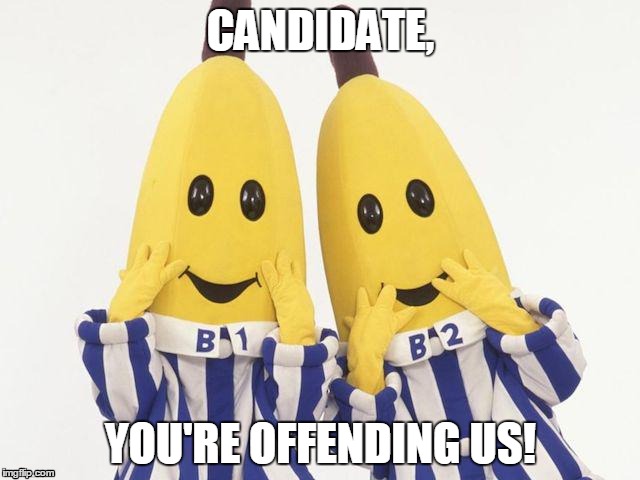
Freedom of speech for “the price of bananas”
In a democracy, election run-ups need to happen in accordance with determined pre-established rules and be followed by somebody who can arbitrate when a candidate or a voter crosses this or that line. Rules may serve to preserve the environment of democratic discussion, prevent the use of a disproportionate economic power or to regulate how, when and where candidates can campaign.
When the campaign starts being done on the Internet, it is not unusual that certain rules have to be adapted to this new setting. The enforcement of laws thought for the offline life sometimes gets uneven when it is necessary to frame them on cases involving the Internet.
This seems to be the case of the right of reply, originally idealized to regulate manifestations made in the more traditional media, like newspapers and magazines, and that increasingly needs to be applied to the context of the Internet.
That’s what happened recently in the Electoral Justice, the branch of the Judiciary responsible for acting as an arbitrator during the campaign process. Rudi Aloísio Rasch, candidate for the City Hall of São João do Oeste, in Santa Catarina, went to Justice in order to have the “right of reply” to a Facebook post. Rudi complained that, in a post done by a user who supported his opposition, a voter made an offensive comment to his honor: “My friends, get ready to have a party on October 2nd, because the opponent is a banana”.
Even after the comment was deleted (staying “online” for just 9 hours), Rudi went to the Electoral Justice to obtain the right of reply provisioned in the legislation. In fact, the article 58 of the Election Law assured the right of reply to candidates “damaged, even in an indirect manner, by concept, image or calumnious affirmation, defamatory, insulting or knowingly untrue, widespread by any social communication media”; the article 57-D, included in 2009, provides that this right will also be granted on the Internet. It is a generic provision; how to enforce it in relation to such various materials such as a text published on a blog, an online newspaper, a tweet, or a Facebook post (a discussion that already happened on this blog)? And more, would it be a “defamatory, insulting or knowingly untrue” affirmation for a voter to call a candidate “banana” to the point of granting him a “right of reply”?

As amazing as it may seem, the first instance of the Electoral Justice considered that the phrase was indeed insulting, and that it should be the object of a right to reply in Facebook, in a similar manner to those that occur in the televised election advertising. The judge determined that the voter who called Rudi “banana” should use his personal profile to post the following comment on the original post: “In the terms of the decision uttered in process of right to reply of the 65th Electoral Zone, I hereby affirm that: ‘The opposition is not a banana. He deserves respect. My offense is deemed of censoring, which can configure insult.’”, and that the original author should keep the response on his post for at least 18 hours — twice the time it was previously visible, according to the electoral legislation.
In the appeal, the voters (the author of the original post and the author of the “offensive” comment) asked for the second instance to reconsider the decision, arguing that it was only an acid criticism. In the decision, the judges understood that “banana” would actually a sufficiently great offense to be granted the right of reply, but observed that, as the comment was made in a public Facebook profile, the candidate himself could reply, directly there. They also noted that the comment did not have a significative effect, getting only a few likes.
The case raises two important discussions. The first is about what can be considered an offense and what limit does the Electoral Justice establish for critical discourse. This is, fundamentally, an issue of freedom of speech. Above all in the election period, when the convictions about candidates are formed, the respect to free manifestation, including those that are more acid or less polished, is crucial for democracy. According to what we have also commented here, politicians, in general, should have a “thicker skin” to resist those kinds of criticisms, including those that are still in campaigning period.
The second discussion is about how to understand the institution of the “right of reply” in the Internet era. When granting it, forcing a citizen to post a comment below the one that was considered offensive, the first instance made an effort to enforce the electoral legislation, taking into account the medium in which the so-called offensive comment was posted. On the other hand, as the second instance noted, in a public profile, such space allows for a reply to be posted by the candidate himself, which would be impossible on the TV or the radio.
The right to reply, in itself quite polemical from the point of view of the debates on freedom of speech, was shaped for an unidirectional mass media, in which the citizens do not contribute with their opinions. To think about the right to reply on the Internet is also to think on the peculiarities of the platforms used and the possibility that the candidates have to reply and dialogue for themselves. More than that, we are talking about the case of a person, a voter, who used a very current word — banana — to refer to a candidate, in the middle of the campaign period. To consider such word to be “offensive” enough to occasion a right of reply is to ignore that freedom of speech also protects more acid or critical manifestations. It is evident that there are limits. But they cannot be so inflated.
See the full decision:
By Dennys Antonialli, Francisco Brito Cruz and Mariana Valente
Translated by Ana Luiza Araujo